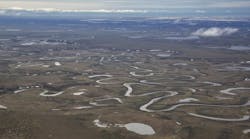The Macondo blowout in the Gulf of Mexico and resulting ban on deepwater drilling in US waters may prove a boon for Canadian oil producers, said Marin Katusa, chief energy strategist of Casey Research, a privately owned provider of subscription financial analysis.
Already, he said, "One in every six barrels of oil consumed daily in the US comes from the oil sands in Alberta." That could escalate if the US government opts for more imports instead of drilling for oil and gas in deep US waters. The Energy Information Administration said US oil production likely will be down 82,000 b/d next year because of delayed or canceled drilling due the moratorium. Monthly production losses could reach 100,000 b/d by December 2011.
Katusa noted, "The gulf accounts for up to 30% of all the oil produced in the US. Should the gulf be put off limits, that shortfall has to be made up from somewhere." Attractive, viable supply options "are far and few in between," he said. "Russia may be a friend now, but its tap-twisting history with gas in Europe does not strike a positive note. The Middle East is hardly America's best friend, not to mention its royalty structures which leave much to be desired. And in Venezuela, Hugo Chavez just recently nationalized 11 oil rigs belonging to a US company."
Katusa said, "Only two real options are left in the hands of the US—the oil sands of Canada or rethinking the drilling ban." Even a revised drilling ban "would still see higher taxes on each barrel produced and tighter regulations for companies coming to the gulf," he said. "Any lease application would come under intense scrutiny and face higher insurance rates. For smaller companies interested in the gulf, the rising production costs mean that the death knell has been sounded."
That leaves Canada, although its oil sands "are pretty controversial stuff, associated with derelict, broken landscapes and carbon emissions." However, Katusa said, "That's going to change very soon. The future of oil sands is here: they are cost effective, and their face is green. Steam-assisted gravity drainage (SAGD) pumps steam into the ground to liquefy the bitumen and stiff crude oil, making it thin enough to be pulled out of the ground. No giant holes or toxic tail-ponds—just two horizontal pipes, one above the other, puffing away efficiently."
He said, "As far as an investment portfolio goes, both options bring with them opportunities. If the US federal court allows a somewhat watered-down version of the drilling ban, the long delay means that there's potential to pick up some great stocks at a cheap price. On the Canadian side of things, there are some well-run companies perfectly combining cash-flow and SAGD technology. The gulf spill might be Obama's Waterloo, but for the careful investor, the winds of change could just blow in a fortune."
Pandora's box
The Macondo spill seems to have become "Pandora's box" for the Obama administration, said Katusa. A federal court slapped down its first ban on deepwater drilling and the government lost that appeal. US Interior Sec. Ken Salazar rewrote the moratorium in hopes it would pass muster. However, analysts at FBR Capital Markets & Co. in Arlington, Va., immediately spotted a potential challenge.
"Interior's decision to allow drilling of waterflood and injection wells while not allowing the drilling of development wells could represent an avenue for further litigation," they said. "According to Interior, injection wells are 'drilled into production reservoirs for which all the relevant geologic information is known' and 'the drilling equipment and procedures…are similar to those already used.' However, in our view, this is substantially similar for development wells." Still, they admit, "Litigation is unlikely to resolve the moratorium issue. The Department of Interior can continue to refine the moratorium or impose almost unlimited requirements regarding safety that will keep the drilling industry in limbo."
With the Gulf Coast's fishing and tourist industries facing financial disaster from the spill, Obama's administration seems set on idling the offshore industry, too. Obama says the moratorium is a preventive measure to ensure safety; opponents see it as a punitive move against fossil fuels. It prompted one Wall Street Journal editorial to observe, "When it comes to a showdown between jobs and ideology, the Obama administration never fails to choose the latter."
More Oil & Gas Journal Current Issue Articles
More Oil & Gas Journal Archives Issue Articles
View Oil and Gas Articles on PennEnergy.com

